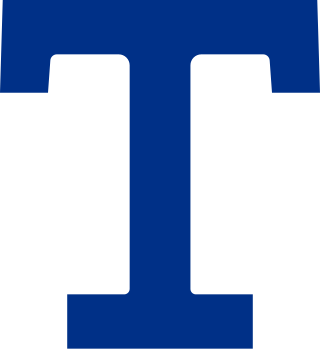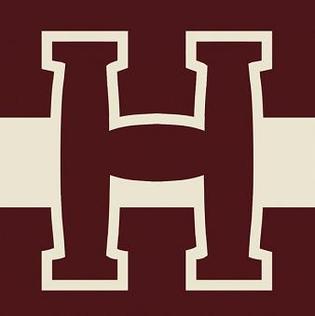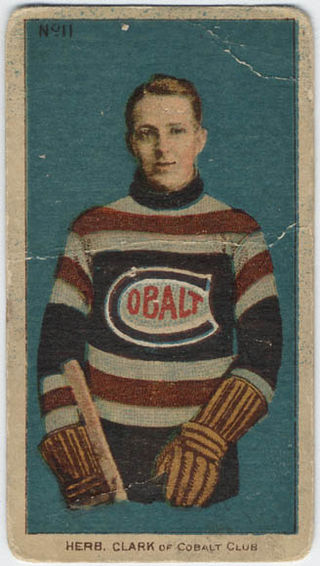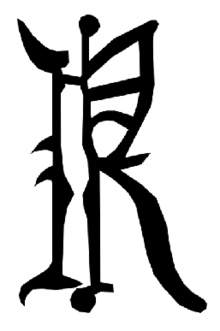
The Montreal Wanderers were an amateur, and later professional, ice hockey team based in Montreal. The team played in the Federal Amateur Hockey League (FAHL), the Eastern Canada Amateur Hockey Association (ECAHA), the National Hockey Association (NHA) and briefly the National Hockey League (NHL). The Wanderers were four-time Stanley Cup winners. Prior to the formation of the NHL, the "Redbands" were one of the most successful teams in hockey.
The National Hockey Association (NHA), initially the National Hockey Association of Canada Limited, was a professional ice hockey organization with teams in Ontario and Quebec, Canada. It is the direct predecessor of today's National Hockey League (NHL) and much of the business processes of the NHL today are based on the NHA. Founded in 1909 by Ambrose O'Brien, the NHA introduced 'six-man hockey' by removing the 'rover' position in 1911. During its lifetime, the league coped with competition for players with the rival Pacific Coast Hockey Association (PCHA), the enlistment of players for World War I and disagreements between owners. The disagreements between owners came to a head in 1917, when the NHA suspended operations in order to get rid of an unwanted owner, Eddie Livingstone.
The 1917–18 NHL season was the first season of the National Hockey League (NHL) professional ice hockey league. The league was formed after the suspension of the National Hockey Association (NHA). Play was held in two halves, December 19 to February 4, and February 6 to March 6. The Canadiens won the first half, and Toronto the second half. The season was contested by four teams, down from six in the previous season, finishing with only three, in Montreal, Ottawa and Toronto. The Montreal Wanderers withdrew early in January 1918 after their rink, the Westmount Arena, burned down. Toronto won the NHL playoff and then won the Stanley Cup, by defeating the PCHA's Vancouver Millionaires three games to two in a best-of-five series.

The Toronto Hockey Club, known as the Torontos and the Toronto Blueshirts, was a professional ice hockey team based in Toronto. They were a member of the National Hockey Association (NHA). The club was founded in 1911 and began operations in 1912. The club won its sole Stanley Cup championship in 1914.
The 1920–21 NHL season was the fourth season of the National Hockey League (NHL). Four teams each played 24 games in a split season. The Quebec franchise was transferred to Hamilton, Ontario, to become the Hamilton Tigers. The Ottawa Senators won the league championship in a playoff with the Toronto St. Patricks. The Senators went on to win the Stanley Cup by defeating the Vancouver Millionaires of the Pacific Coast Hockey Association three games to two in a best-of-five series. This would be the last split season before the NHL changed its regular season and playoff formats.

John Ambrose O'Brien was a Canadian industrialist and sports team owner. He was a founder of the National Hockey Association (NHA), owner of the Renfrew Millionaires and the founding owner of the Montreal Canadiens professional ice hockey team.
The 1910–11 NHA season was the second season of the now defunct National Hockey Association. The Ottawa Hockey Club won the league championship. Ottawa took over the Stanley Cup from the Montreal Wanderers and defended it against teams from Galt, Ontario, and Port Arthur, Ontario.
The 1911–12 NHA season was the third season of the National Hockey Association (NHA). Four teams played 18 games each. The Quebec Bulldogs would win the league championship and take over the Stanley Cup.
Les Canadiens was the original name of the Montreal Canadiens professional ice hockey team in the National Hockey Association (NHA), as used in the 1910 season. This was the founding season of the Canadiens hockey club, which now is a franchise member of the National Hockey League (NHL).

The Haileybury Hockey Club were an ice hockey based in Haileybury, Ontario, which existed from 1906 to 1915. The team is notable for being a founding member of the National Hockey Association (NHA), the predecessor to the National Hockey League (NHL). Established to capitalize on the then-current mining boom in northern Ontario, it became clear that the town was too small to support major professional ice hockey, and the team left the NHA after its inaugural season.

The Cobalt Silver Kings of Cobalt, Ontario, were a professional ice hockey club established in 1906. The team is notable for being a founding member of the National Hockey Association, the predecessor to the National Hockey League. Established to capitalize on the then-current mining boom in northern Ontario, it became clear that the town was too small to support major professional hockey, and the team left the NHA after its inaugural season. The club was owned by Renfrew, Ontario mine operator Ambrose O'Brien.
The 1909 ECHA season was the fourth and final season of the Eastern Canada Hockey Association (ECHA). Teams played a twelve-game schedule. The Ottawa Hockey Club would win the league championship with a record of ten wins, two losses and take over the Stanley Cup.
The 1909–10 Montreal Canadiens season was the team's inaugural season and also the first season of the National Hockey Association (NHA). The 1910 Montreal Canadiens operated as 'Les Canadiens' and were owned by Ambrose O'Brien of Renfrew, Ontario, as one of four franchises he owned in the NHA. After the season, the franchise was suspended and a NHA franchise was sold to George Kennedy. All of the players of 'Les Canadiens' went to Kennedy's organization.
The 1910–11 Montreal Canadiens season was the team's second season and also the second season of the National Hockey Association (NHA). The club would improve to an 8–8 record, second in the league. It was the first season for Georges Vezina and he would lead the league in goals against average (GAA) with a record of 3.9 goals per game. Newsy Lalonde joined the team from Renfrew and led the team with 19 goals.
The 1912–13 Montreal Canadiens season was the team's fourth season and fourth of the National Hockey Association (NHA). The club would post a 9–11 record and tie for third place.

The Hon. Michael John O'Brien was a railway builder, industrialist and philanthropist. He was named to the Senate of Canada in 1918. He was a founder of the town of Renfrew, Ontario. He was instrumental in the early history of professional ice hockey in Eastern Canada.

The Timiskaming Professional Hockey League (TPHL) was a minor professional ice hockey league based in the area of Lake Timiskaming, Canada. Founded in 1906, the league is notable for providing teams and Ambrose O'Brien, a founder of the National Hockey Association and the founding owner of the Montreal Canadiens.

Herbert Secord Clarke was a Canadian professional ice hockey player who played in various professional and amateur leagues, including the National Hockey Association (NHA). Amongst the teams he played with were the Cobalt Silver Kings.
The 1908–09 Montreal Wanderers season was the sixth season of play of the Montreal Wanderers. The Wanderers, as defending Stanley Cup champions, defended the Cup against Edmonton before the season started. The Wanderers finished second overall in the ECHA standings and the Ottawa Hockey Club would win the league championship to take over the Stanley Cup.
The 1910 NHA season was the first season of the National Hockey Association men's professional ice hockey league. The season started on January 5, but was suspended immediately and the league then absorbed the Ottawa and Shamrocks teams of the Canadian Hockey Association and the season continued from January 15 to March 15. Seven teams played 12 games each. The Ottawa Hockey Club played two Stanley Cup challenges during the season, but lost the Cup to their rivals the Montreal Wanderers who won the league championship and played a Cup challenge afterwards.









